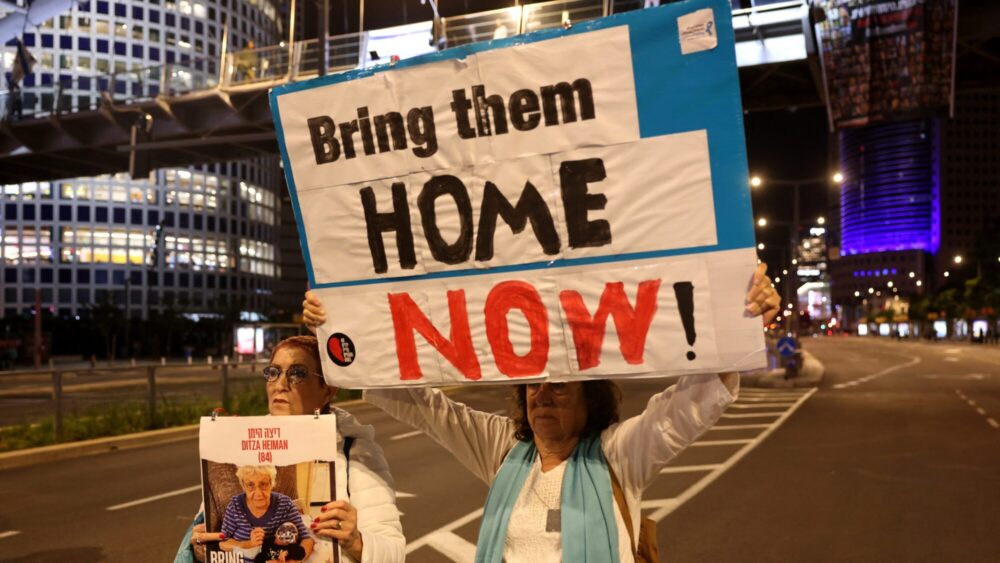
Families of Israeli hostages in the Gaza Strip protest outside the ministry of defence in Tel Aviv
(Photo by AHMAD GHARABLI / AFP)
Israel and Hamas announced a deal on Wednesday allowing at least 50 hostages and scores of Palestinian prisoners to be freed, while offering Palestinians caught in the crossfire a four-day pause from fighting between Hamas terrorists and Israeli Defense Forces.
In the first major breakthrough in recovering hostages taken by Hamas on October 7th, the terrorist group will release 50 kidnapped women and children during a four-day ceasefire.
After weeks of Qatar-brokered negotiations, Israeli Prime Minister Benjamin Netanyahu’s cabinet approved the deal on Wednesday after a near-all-night meeting, in which he told ministers this was a “difficult decision but it’s a right decision.”
Israel’s hawkish Defence Minister Yoav Gallant said before the crunch meeting that he had won assurances that the deal would not spell the end of the war.
“Immediately after we have exhausted this phase” he said, security operations would “continue in full force”.
The government underscored in a statement that Israel “will continue the war in order to return home all of the hostages, complete the elimination of Hamas and ensure that there will be no new threat to the State of Israel from Gaza”.
The cabinet’s sign-off was one of the last stumbling blocks after what one U.S. official described as five “extremely excruciating” weeks of talks.
Hamas released a statement welcoming the “humanitarian truce” and said it would also see 150 Palestinians released from Israeli jails.
“The resistance is committed to the truce as long as the occupation honors it,” a Hamas official told AFP. But, Hamas also said in its statement, its hands “will remain on the trigger.”
On October 7th, Hamas carried out a massacre of civilians, the worst in Israel’s history, that left around 1,200 people dead.
The terrorist group also took an estimated 240 Israelis and foreigners hostage, among them elderly people and young children.
Israel then launched a counter-offensive against Hamas and vowed to bring the hostages home and to destroy the terrorist group. The campaign has consisted of both bombing and a ground offensive concentrated in the north of the Gaza Strip. IDF have called on Palestinian civilians to evacuate the northern part of Gaza where the fighting is most intense through humanitarian corridors it opens daily.
Israel said that to facilitate the hostage release it would initiate a four-day “pause” in its six-week-old air, land, and sea assault of Gaza, while it stressed that the agreement did not spell the end of the war.
For every 10 additional hostages released, there would be an extra day’s ”pause,” the Israeli government said.
The negotiations have involved the U.S. Central Intelligence Agency, Israel’s overseas spy agency Mossad, Egyptian intelligence, and leaders in Doha, Cairo, Washington, Gaza, and Israel.
A senior U.S. official said three Americans, including three-year-old Abigail Mor Idan, were among the 50 earmarked for staggered release from Thursday.
U.S. President Joe Biden said he was “extraordinarily gratified that some of these brave souls … will be reunited with their families once this deal is fully implemented”.
Qatar’s foreign ministry confirmed the deal, saying that “a number of Palestinian women and children detained in Israeli prisons” would be released in exchange for the hostages.
“The starting time of the pause will be announced within the next 24 hours and last for four days, subject to extension,” the ministry said.
The deal was greeted by countries including Britain, China, Egypt, France and Germany, whose Foreign Minister Annalena Baerbock hailed the “breakthrough” and said “the humanitarian pause must be used to bring vital aid to people in Gaza”.
Ahead of the Israeli cabinet vote, Netanyahu had faced criticism from within his right-wing coalition, some of whom thought the deal gave too much to the terrorists.
Hardline Minister for National Security Itamar Ben-Gvir signalled he would vote against the agreement, saying it should include the release of Israeli soldiers also taken by Hamas.
But with dozens of families in Israel who are desperate to have their loved ones released, and continued demonstrations in Israel calling on the government to bring the hostages home, the government ultimately set aside any misgivings.
